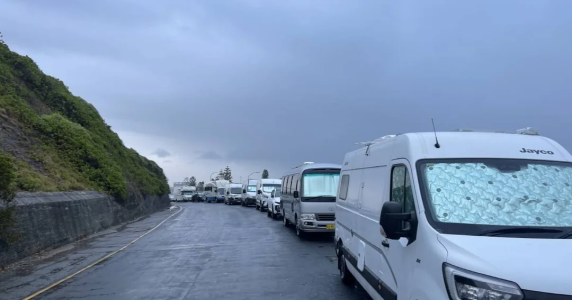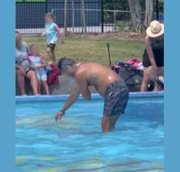'Out of control': Residents furious as parking spaces vanish at local beach
By
Maan
- Replies 0
Illegal camping has become a major point of tension across Australia, especially as public spaces like beaches are taken over by those seeking a place to stay.
What seemed like a simple issue has escalated into a nationwide problem, sparking heated debates about local management, parking regulations, and the balance between tourism and residents' rights.
As tensions rise, the consequences of this growing trend are becoming more apparent in one popular beachside community.
Illegal camping has become a contentious issue across Australia.
Many residents are frustrated by the growing number of tourists and people displaced by the cost-of-living crisis, taking over beloved beachside spots.
A recent incident involving a beachgoer relaxing next to a caravan in a car park has ignited a storm of criticism.
Locals in Newcastle’s Horseshoe Beach area were particularly vocal.
One described the situation as ‘out of control’ and slammed the illegal campers for taking up valuable parking spots.
‘Setting up full campsites, taking up 2-3 normal car spaces and staying there all day is a joke,’ said one disgruntled resident.
The sight of caravans occupying multiple spaces all day long has angered beachgoers, with some unable to park due to the campers’ actions.
‘I can’t find a park on busy days when these campers are taking up 50+ car spots collectively, knowing there are no consequences to what they’re doing,’ another local added.
The issue has led many to question why council officials have done little to address the growing problem.
Despite the complaints, a spokesperson for the City of Newcastle stated that the car park is managed by the NSW Government, not the council.
‘NSW Government laws do not provide councils with the regulatory powers to move on overnight campers. Instead, this power rests with NSW Police,’ the spokesperson explained.
According to Transport for NSW, parking is free.
However, vehicles are only allowed to park for a maximum of four hours between 9:00 am and 5:00 pm, though enforcement of these rules has been inconsistent.
‘The state government has not undertaken enforcement action to free up the Horseshoe Beach car park or any other state-owned parking areas in the LGA in the past 12 months,’ the spokesperson admitted.
The spokesperson also mentioned an ongoing lease agreement with the council that ended in 2018, leaving unresolved issues over the management of the land.
The council has since held discussions to reinstate its powers to regulate activities on the land.
This issue is not isolated, as councils across the country struggle to manage illegal camping.
In Fraser Coast, the local council recently announced a crackdown on illegal campers after an increase in criminal activity and property damage.
However, councils like the Town of Cambridge in Perth have taken alternative measures, such as turning off hot water in public showers to deter illegal camping.
Danny Gorog, CEO of Snap Send Solve, pointed out the widespread nature of the issue, noting that many urban areas are particularly affected by illegal parking and safety concerns.
‘Residents can report illegally parked RVs in under one minute using the free and easy-to-use Snap Send Solve app,’ Gorog said.
According to recent data, illegal camping reports across Australia were as follows in October 2024:
In a previous story, we explored how parking behaviour like this has sparked outrage across the country.
Could it be happening near you? Read more to find out.

What do you think is the best solution to this growing issue? Share your thoughts in the comments below.
What seemed like a simple issue has escalated into a nationwide problem, sparking heated debates about local management, parking regulations, and the balance between tourism and residents' rights.
As tensions rise, the consequences of this growing trend are becoming more apparent in one popular beachside community.
Illegal camping has become a contentious issue across Australia.
Many residents are frustrated by the growing number of tourists and people displaced by the cost-of-living crisis, taking over beloved beachside spots.
A recent incident involving a beachgoer relaxing next to a caravan in a car park has ignited a storm of criticism.
Locals in Newcastle’s Horseshoe Beach area were particularly vocal.
One described the situation as ‘out of control’ and slammed the illegal campers for taking up valuable parking spots.
‘Setting up full campsites, taking up 2-3 normal car spaces and staying there all day is a joke,’ said one disgruntled resident.
The sight of caravans occupying multiple spaces all day long has angered beachgoers, with some unable to park due to the campers’ actions.
‘I can’t find a park on busy days when these campers are taking up 50+ car spots collectively, knowing there are no consequences to what they’re doing,’ another local added.
The issue has led many to question why council officials have done little to address the growing problem.
Despite the complaints, a spokesperson for the City of Newcastle stated that the car park is managed by the NSW Government, not the council.
‘NSW Government laws do not provide councils with the regulatory powers to move on overnight campers. Instead, this power rests with NSW Police,’ the spokesperson explained.
According to Transport for NSW, parking is free.
However, vehicles are only allowed to park for a maximum of four hours between 9:00 am and 5:00 pm, though enforcement of these rules has been inconsistent.
‘The state government has not undertaken enforcement action to free up the Horseshoe Beach car park or any other state-owned parking areas in the LGA in the past 12 months,’ the spokesperson admitted.
The spokesperson also mentioned an ongoing lease agreement with the council that ended in 2018, leaving unresolved issues over the management of the land.
The council has since held discussions to reinstate its powers to regulate activities on the land.
This issue is not isolated, as councils across the country struggle to manage illegal camping.
In Fraser Coast, the local council recently announced a crackdown on illegal campers after an increase in criminal activity and property damage.
However, councils like the Town of Cambridge in Perth have taken alternative measures, such as turning off hot water in public showers to deter illegal camping.
Danny Gorog, CEO of Snap Send Solve, pointed out the widespread nature of the issue, noting that many urban areas are particularly affected by illegal parking and safety concerns.
‘Residents can report illegally parked RVs in under one minute using the free and easy-to-use Snap Send Solve app,’ Gorog said.
According to recent data, illegal camping reports across Australia were as follows in October 2024:
- Victoria: 2,936 reports
- New South Wales: 2,048 reports
- Queensland: 1,610 reports
- Western Australia: 636 reports
- South Australia: 136 reports
- Tasmania: 34 reports
In a previous story, we explored how parking behaviour like this has sparked outrage across the country.
Could it be happening near you? Read more to find out.
Key Takeaways
- Illegal camping is causing growing tension across Australia, particularly at beachside locations, as tourists and displaced residents take up valuable parking and public spaces.
- Locals, especially in Newcastle's Horseshoe Beach area, have expressed frustration, with one resident describing the situation as ‘out of control’ due to campers occupying multiple spaces all day.
- While parking is free at Horseshoe Beach, enforcement of parking regulations has been inconsistent, and the NSW Government, not the council, holds the authority to regulate overnight campers.
- The issue of illegal camping is widespread, with councils across the country grappling with how to manage it, with some areas announcing crackdowns and others taking alternative measures like restricting public facilities.
What do you think is the best solution to this growing issue? Share your thoughts in the comments below.








